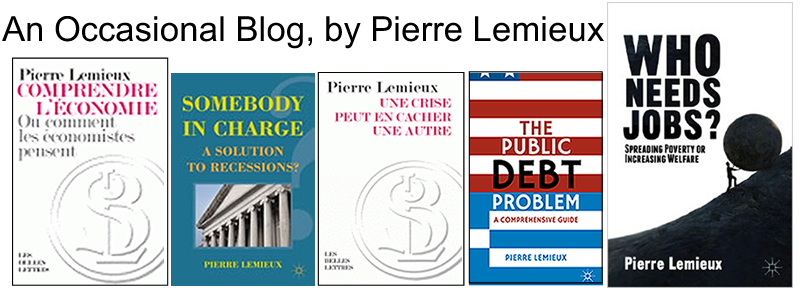A “bad bank”, a solution adopted by many governments to solve banking crises, is a bank to which all toxic assets are transferred. It would be nice if a “bad state” could be similarly created, to which the bad policies of all states in the world would be transferred. Of course, nobody would be willing to live under such a bad state, for it would be hell on earth.
Category Archives: Blog posts
Riskless Securities for the Welfare State
Economic historian Harold Vatter defending the mixed economy and the Welfare State in a 1979 article (“Perspective on the Forty-Sixth Anniversary of the U.S. Mixed Economy”, Explorations in Economic History 16, p. 319): “The much-maligned public deficits provided business (and households) with a vast new influx of riskless securities for their asset portfolios. Banks hardly ever failed . . .”
Short-term and Long-term Interest Rates
The chart below shows how, in the long run, short-term and long-term interest rates can’t diverge much, how they follow the same trend. It also shows how the manipulation of short-term rates by the Fed is not very successful in moving long-term rates: see what happens during and following the recent recession.

The “Interview” That Never Was
http://www.naftemporiki.gr/news/cstory.asp?id=2075654
This interview in a Greek newspaper is a fraud. I never met the journalist nor was I at the conference where he claims he made it.
Addendum of May 23, 2015: The linked article has now disappeared (although it must still be findable in the paper publication). The name of the journalist who published the made-up interview is Athanasios Papandropoulos.
Consumption
If you don’t like the consumer society, it’s okay: just be content with working and producing. I’ll consume what you produce.
Privacy Is Overrated
There is a form of privacy that is highly overrated. When you participate in social gatherings, whether on the street or on Facebook, you must expect your privacy to be partly exposed. And, of course, if you throw bits of personal information on passers-by in the street – as some do by not protecting their home computer networks – then you can blame only yourself if somebody peeps at the electrons hitting him. If you want total privacy, life in society is not for you. Most individuals, however, are willing to sacrifice some privacy for the benefits of social life.
There is another form of privacy which, paradoxically, is much underrated, Continue reading
Return of the “Lalonde Doctrine”
Government of Canada: “When there is a risk of serious or irreversible harm, the government recognizes that the absence of full scientific certainty shall not be used as a reason for postponing decisions to protect the health and safety of Canadians, the environment, or the conservation of natural resources.”
In other words, when we want to do something, let’s do it even if we don’t know what will be the consequences.
Blaming “Wall Street”
The only blame that can be addressed to Wall Street firms is that they are all tightly regulated and that many were recently subsidized by government. In many ways, they have become arms of the state. On this, see my Somebody in Charge: A Solution to Recessions? (New York: Palgrave-Macmillan, 2011). Of course, the statocrats who tried to fill their financial roles in Soviet Russia, or those who do it today in China or Venezuela, are much less efficient and much more dangerous.
This does not mean that we have to love Wall Street figures, not more than we should love the ignorant lost souls who demonstrate under the latter’s balconies, nor the politicians and bureaucrats who reign over all that.
Liberty is as inconsistent with French-Revolution type of populism (especially after 1791) as it is with autocracy. Indeed, the first one naturally leads to the other.
Should the Swiss Franc Be Lower or the Dollar Higher?
A currency has no ideal price nor any ideal degree of “strength” or “weakness”. The more a currency is demanded by either foreign importers or investors — thus the more your country exports or is deemed to be a good investment place — the higher will be the price of the currency (assuming your country has a separate one, or a few distinct ones). This price, also called the rate of exchange, is as much a result of other economic activities as it influences them, just like any price is as much a result of supply and demand as it determines quantity demanded and supplied. But again. there is no ideal price. And note that exports are not more a goal, except for exporters, than working is the objective, except as a means to exchange the product of one’s labor for consumption (including imported) goods.

